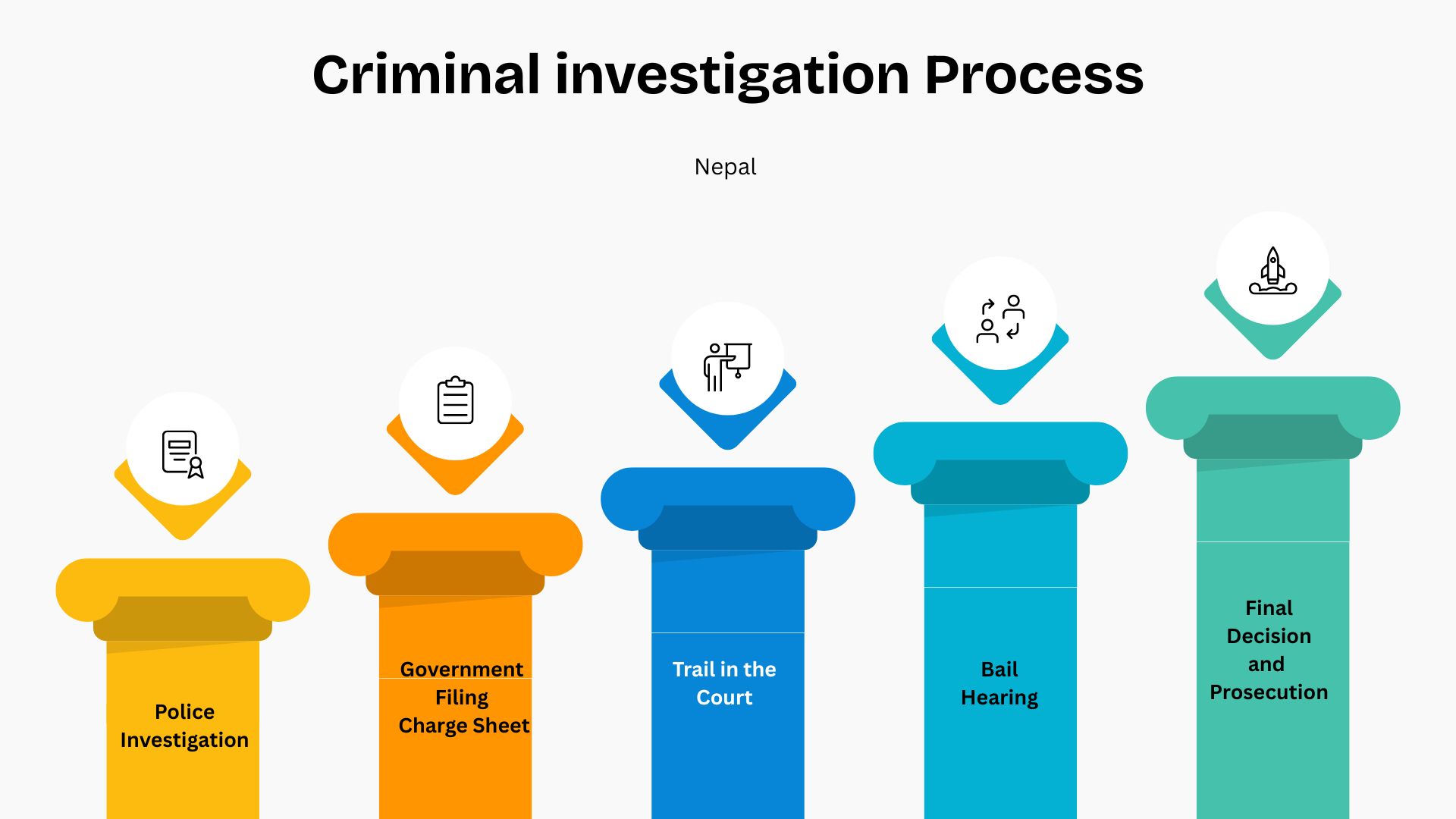Understanding Nepal's Modern Criminal Justice Framework
The National Code has been replaced by the Muluki Criminal Code and its Code of Procedures and the Muluki Civil Code and its Code of Procedures on August 17, 2018, marking a revolutionary transformation in Nepal's legal landscape. This comprehensive reform introduced structured criminal procedures that ensure justice while protecting individual rights under the constitutional framework established in 2015.
Criminal law in Nepal operates through a sophisticated system designed to balance punishment with rehabilitation, ensuring that justice serves both victims and society at large. The current framework represents decades of legal evolution, incorporating international standards while respecting Nepal's cultural and social context.
How Criminal Cases Progress Through Nepal's Justice System
The criminal justice process begins when authorities become aware of potential criminal activity through various channels including police reports, victim complaints, or witness testimonies. Investigation done by Police and if proved then the case is forwarded to the District Court, establishing a clear procedural pathway that ensures thorough examination of evidence before formal charges are filed.
Initial investigations are conducted by Nepal Police, who gather evidence, interview witnesses, and prepare comprehensive reports for judicial review. During this phase, suspects enjoy specific rights including legal representation, protection against self-incrimination, and fair treatment throughout the investigative process.
Once police complete their investigation, cases are forwarded to the District Attorney's office for prosecutorial review. Prosecutors evaluate evidence quality, witness credibility, and legal sufficiency before deciding whether to file formal charges in district courts.
The formal court process involves multiple stages including arraignment, where charges are read and defendants enter pleas; discovery, where evidence is shared between prosecution and defense; and trial proceedings where guilt or innocence is determined through adversarial proceedings before impartial judges.
Key Criminal Offenses Under Nepal's Penal Code
Nepal's criminal law categorizes offenses based on severity and social impact, with corresponding punishment structures reflecting the seriousness of different criminal acts. Serious crimes such as homicide, rape, assault, kidnapping, domestic violence etc. receive enhanced attention and carry significant penalties designed to deter future criminal behavior while providing justice for victims.
Violent crimes constitute the most serious category of criminal offenses, including murder, manslaughter, assault causing grievous bodily harm, and sexual violence. These offenses carry substantial prison sentences and often involve mandatory minimum sentencing guidelines that limit judicial discretion in punishment determination.
Property crimes encompass theft, burglary, robbery, fraud, and embezzlement, with punishment severity varying based on the value of stolen property and circumstances surrounding the criminal act. Modern interpretations include cybercrime and digital fraud, reflecting technological advancement in criminal methodology.
Public order offenses address activities that disrupt social harmony including rioting, unlawful assembly, public intoxication, and disturbing the peace. These crimes often carry moderate penalties but can escalate when combined with other criminal behaviors.
White-collar crimes have gained prominence in Nepal's legal system, encompassing corruption, bribery, money laundering, and tax evasion. Moreover, those involved in the match fixing during the international sports will be taken as an act of treason, demonstrating the expanding scope of criminal law to address modern challenges facing Nepali society.
Punishment and Sentencing Guidelines
Thus, for example, under the provisions of punishment in Nepal include capital punishment, life imprisonment with confiscation of property, life imprisonment only, simple imprisonment with fine, simple imprisonment only, and simple fine only, establishing a comprehensive sentencing framework that allows judicial flexibility while maintaining consistency across similar cases.
Life imprisonment in six crimes will be sentenced to life in prison. The terms of life imprisonment is extended to 25 years, representing significant reform in how serious crimes are punished. This change reflects international standards while ensuring that the most dangerous criminals remain incarcerated for substantial periods.
Age-based sentencing modifications protect juvenile offenders through specialized procedures and reduced penalties. For Persons from the age of Ten years to Fourteen Years, a maximum of six months of imprisonment or a placement in a reform home for up to a year is given instead of Regular Imprisonment. Persons from the age of 14 years to 16 years are liable to face half of the term of imprisonment or penalty, demonstrating Nepal's commitment to rehabilitative justice for young offenders.
Alternative sentencing options include community service, probation, house arrest, and restorative justice programs that emphasize rehabilitation over pure punishment. These alternatives are particularly relevant for first-time offenders and non-violent crimes where community-based solutions may prove more effective than traditional incarceration.
Financial penalties complement imprisonment sentences, with fine amounts calculated based on crime severity, defendant's financial capacity, and victim restitution requirements. Modern applications include asset forfeiture for corruption cases and restitution orders that compensate victims for financial losses.
Recent Legal Developments and Modern Applications
According to the provisions, listening to or recording a conversation between two or more people and photographing someone without their consent is now a criminal offence. Anyone found violating these rules faces one year in prison and a fine of Rs. 10,000 or both, reflecting how Nepal's criminal law adapts to address privacy concerns in the digital age.
Religious conversion restrictions have been strengthened through criminal penalties. Anybody who encourages or is involved in religious conversion using any means would be booked under criminal offence and would face a jail term of five years and Rs 50,000 fine. Any foreigner found guilty of such practice will be deported within a week, addressing concerns about forced religious conversions while maintaining religious freedom protections.
Enhanced protection for high-ranking officials reflects national security priorities. If the President or the Vice-President is issued threat, the issuer would be handed seven years' jail terms or the fine of Rs 70,000, or both, ensuring that threats against constitutional leaders are treated with appropriate seriousness.
Espionage and national security crimes carry severe penalties in recognition of their threat to national sovereignty. Anyone found spying against Nepal would be awarded 25 years' imprisonment, demonstrating Nepal's commitment to protecting state secrets and national interests.
Key changes include criminalization of Chhaupadi, stronger punishments for rape, outlawing torture, extending life imprisonment to 25 years, and protections for crime victims, showing how criminal law reform addresses traditional harmful practices while strengthening victim protection mechanisms.
How to Protect Your Rights During Criminal Proceedings
Understanding your constitutional rights forms the foundation of effective legal defense in criminal cases. These rights include presumption of innocence until proven guilty, right to legal representation, protection against unreasonable searches and seizures, and right to remain silent during questioning.
Legal representation should be secured immediately upon arrest or formal charging, as experienced criminal lawyers understand procedural requirements and can protect defendants from prosecutorial overreach. Public defenders are available for individuals who cannot afford private legal counsel, ensuring that economic status does not determine access to justice.
Evidence preservation becomes crucial in building effective defense strategies, as physical evidence, witness statements, and documentation can significantly impact case outcomes. Defendants should maintain detailed records of interactions with law enforcement and avoid discussing case details with anyone except their legal counsel.
Understanding plea bargaining opportunities allows defendants to make informed decisions about accepting reduced charges in exchange for guilty pleas. This process can result in lighter sentences but requires careful evaluation of evidence strength and potential trial outcomes.
Frequently Asked Questions About Criminal Law in Nepal
How long can police detain someone without formal charges? Police can detain suspects for up to 24 hours for investigation purposes, with extensions possible through court orders in serious cases. Extended detention requires judicial approval and must be based on reasonable evidence of criminal activity.
What happens if I cannot afford a lawyer? Nepal's constitution guarantees legal representation for all defendants, with public defenders appointed for individuals who cannot afford private counsel. These lawyers are qualified legal professionals who provide competent representation in criminal proceedings.
Can criminal charges be dropped after filing? Yes, prosecutors can dismiss charges if evidence proves insufficient or if new information emerges that undermines the case. However, dismissal requires formal court procedures and cannot occur arbitrarily without legal justification.
How does the bail system work in Nepal? Bail is available for most criminal offenses except the most serious crimes like murder or treason. Bail amounts are set based on flight risk, community ties, and crime severity, with conditions including regular check-ins and travel restrictions.
What rights do crime victims have? Victims have rights to information about case progress, protection from intimidation, restitution for financial losses, and participation in court proceedings through victim impact statements during sentencing phases.
Can foreigners be tried under Nepali criminal law? Yes, foreign nationals who commit crimes in Nepal are subject to Nepali criminal law and court jurisdiction. However, consular notification rights ensure that embassies are informed of arrests involving their citizens.
How do appeals work in criminal cases? Convicted defendants can appeal verdicts to higher courts within specified time limits, typically 35 days from sentencing. Appeals must be based on legal errors or procedural violations that may have affected trial outcomes.
What is the statute of limitations for criminal charges? Most criminal offenses have no statute of limitations in Nepal, meaning charges can be filed regardless of time elapsed since the crime occurred. However, some minor offenses may have time restrictions for prosecution.
Criminal law in Nepal continues evolving to address contemporary challenges while maintaining fundamental justice principles. Understanding these legal frameworks empowers citizens to navigate the system effectively while protecting their rights and contributing to a just society that serves all Nepali people through fair application of criminal justice principles.





